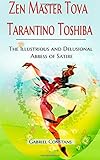 In Chewed Confession, Cheryl Kerwin’s Indie Excellence Finalist Book Award book, characters are connected in a straight-forward linear manner. In this case, the characters in these stories are often friends, family, colleagues, or acquaintances. Thus the main character of one story might casually call a friend or family member and this friend becomes the main character in the following story. This is generally the pattern throughout.
In Chewed Confession, Cheryl Kerwin’s Indie Excellence Finalist Book Award book, characters are connected in a straight-forward linear manner. In this case, the characters in these stories are often friends, family, colleagues, or acquaintances. Thus the main character of one story might casually call a friend or family member and this friend becomes the main character in the following story. This is generally the pattern throughout.
Tag: fiction
A review of Zen Master Tova Tarantino Toshiba – The Illustrious and Delusional Abbess of Satire by Gabriel Constans
 What is interesting about this book is that it is presented in such a way as to appear serious and it is only in the fineprint that fiction is mentioned (and oh, I’ve just noticed the words “delusional” and “satire” in the title). If a newbie to zen philosophy picked it up, there’s enough sentences in this book to convince them it’s non-fiction; a book to be studied and unravelled.
What is interesting about this book is that it is presented in such a way as to appear serious and it is only in the fineprint that fiction is mentioned (and oh, I’ve just noticed the words “delusional” and “satire” in the title). If a newbie to zen philosophy picked it up, there’s enough sentences in this book to convince them it’s non-fiction; a book to be studied and unravelled.
A review of Act of Fear by Michael Collins
 All the characters are terrific, utterly convincing; there is an authentic sense of place: Chelsea, N.Y., a blue-collar neighbourhood where authority figures, police officers most of all, are treated with suspicion; and there’s Fortune’s voice, streetwise but by no means hard-boiled, compassionate yet missing nowt. And with a nice line in epigrams: ‘A man in prison needs a human word.’ ‘Unanswered questions are like lurking monsters.’
All the characters are terrific, utterly convincing; there is an authentic sense of place: Chelsea, N.Y., a blue-collar neighbourhood where authority figures, police officers most of all, are treated with suspicion; and there’s Fortune’s voice, streetwise but by no means hard-boiled, compassionate yet missing nowt. And with a nice line in epigrams: ‘A man in prison needs a human word.’ ‘Unanswered questions are like lurking monsters.’
A review of Perla by Carolina De Robertis
 Breadth of vision and the ability to construct tension from the first page maintains the drama as the events wind and twist through each step taken toward the inexorable truth about Perla, her parents, her lineage and her country. It is a journey well worth taking.
Breadth of vision and the ability to construct tension from the first page maintains the drama as the events wind and twist through each step taken toward the inexorable truth about Perla, her parents, her lineage and her country. It is a journey well worth taking.
A review of Going Indigo by Sam North
 Sam North also achieves the virtually impossible by treating the subject of auras, ghosts and fortune-telling seriously and intelligently. It could all too easily become a shallow ghost story or cliched horror novel. His colloquial, matter-of-fact style is something to do with the reason it isn’t, but it is more than that.
Sam North also achieves the virtually impossible by treating the subject of auras, ghosts and fortune-telling seriously and intelligently. It could all too easily become a shallow ghost story or cliched horror novel. His colloquial, matter-of-fact style is something to do with the reason it isn’t, but it is more than that.
A review of One Evening in Paris by Nicolas Barreau
 The discussion of film elevates the novel above and beyond category romance. Alain’s Uncle Bernard liked films that “had an idea… moved people…[and] gave them a dream to take with them” – all elements necessary for a good story, whether on film or in print. Through Alain, Nicolas Barreau lists the “golden rules” of good film comedy: “a chase is better than a conversation”; “a bedroom is better than a living room”, and “an arrival is better than a departure.” Barreau uses these storytelling principles to good effect in One Evening in Paris.
The discussion of film elevates the novel above and beyond category romance. Alain’s Uncle Bernard liked films that “had an idea… moved people…[and] gave them a dream to take with them” – all elements necessary for a good story, whether on film or in print. Through Alain, Nicolas Barreau lists the “golden rules” of good film comedy: “a chase is better than a conversation”; “a bedroom is better than a living room”, and “an arrival is better than a departure.” Barreau uses these storytelling principles to good effect in One Evening in Paris.
A review of Small Blessings by Martha Woodroof
 Small Blessings touches on issues like the consquences of adultery, along with alcoholism and drug abuse, but uses them as devices rather than serious themes. At the end of Small Blessings we find Rose crossing her fingers, “hoping against hope that life really might be that simple.” Unfortunately, real life isn’t as simple as it is presented in this feel-good romance.
Small Blessings touches on issues like the consquences of adultery, along with alcoholism and drug abuse, but uses them as devices rather than serious themes. At the end of Small Blessings we find Rose crossing her fingers, “hoping against hope that life really might be that simple.” Unfortunately, real life isn’t as simple as it is presented in this feel-good romance.
A review of The Handkerchief Map by Kiri English-Hawke
 Written by Kiri English-Hawke when she was a schoolgirl, this short, insightful narrative affirms that the current generation of young people are still affected and troubled by the Holocaust of WW2 when ordinary citizens’ lives were scarred by an horrific and hideous conflict that made no sense. It is a remarkable achievement as it offers a very positive picture on the resilience of the human spirit in the landscape of war.
Written by Kiri English-Hawke when she was a schoolgirl, this short, insightful narrative affirms that the current generation of young people are still affected and troubled by the Holocaust of WW2 when ordinary citizens’ lives were scarred by an horrific and hideous conflict that made no sense. It is a remarkable achievement as it offers a very positive picture on the resilience of the human spirit in the landscape of war.
A review of Faulkner and Friends by Vicki Salloum
 Like Faulkner, Salloum writes impressionistically and uses stream-of-consciousness narration, demanding that the reader do some work to put together the strands of the characters’ stories. While his main themes are race, and the Southern heritage while hers is poverty. In some respects, Salloum’s novel resembles John Steinbeck’s Cannery Row in its celebration of people on society’s fringes.
Like Faulkner, Salloum writes impressionistically and uses stream-of-consciousness narration, demanding that the reader do some work to put together the strands of the characters’ stories. While his main themes are race, and the Southern heritage while hers is poverty. In some respects, Salloum’s novel resembles John Steinbeck’s Cannery Row in its celebration of people on society’s fringes.
A Conversation with Elizabeth Gilbert
 The author of The Signature of All Things talks about her return to the novel, about shifting genre gears, about the impact of popularity and notions of success, the book’s epigraph, on achieving authenticity, her characters, on the spiritual aspects of her book, and lots more.
The author of The Signature of All Things talks about her return to the novel, about shifting genre gears, about the impact of popularity and notions of success, the book’s epigraph, on achieving authenticity, her characters, on the spiritual aspects of her book, and lots more.